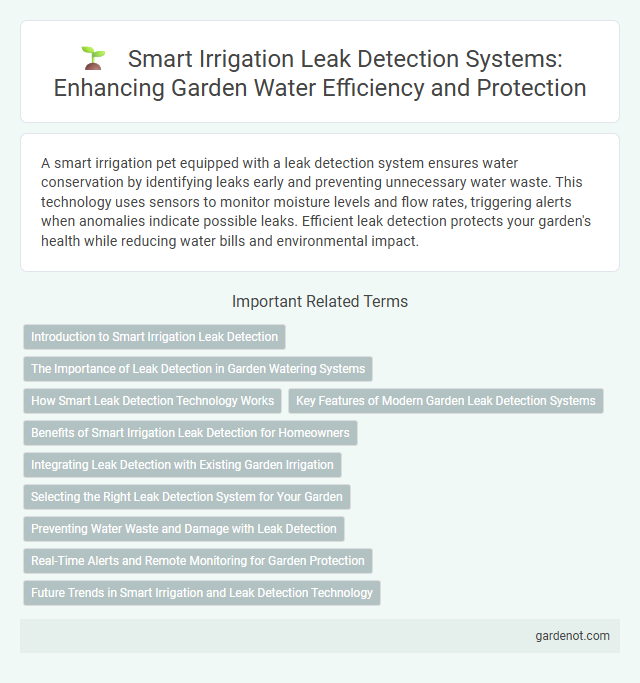A smart irrigation pet equipped with a leak detection system ensures water conservation by identifying leaks early and preventing unnecessary water waste. This technology uses sensors to monitor moisture levels and flow rates, triggering alerts when anomalies indicate possible leaks. Efficient leak detection protects your garden's health while reducing water bills and environmental impact.
Introduction to Smart Irrigation Leak Detection
Smart irrigation leak detection systems leverage advanced sensors and real-time data analytics to identify water leaks promptly, minimizing water waste and preventing crop damage. These systems integrate soil moisture sensors, flow meters, and pressure monitors to detect abnormal water usage patterns indicative of leaks. Implementing smart leak detection enhances irrigation efficiency, conserves water resources, and reduces operational costs in agricultural management.
The Importance of Leak Detection in Garden Watering Systems
Effective leak detection in garden watering systems prevents water waste, reduces utility costs, and safeguards plant health by ensuring consistent moisture levels. Advanced sensors identify leaks early, minimizing soil erosion and avoiding damage to irrigation infrastructure. Integrating leak detection enhances the sustainability and efficiency of smart irrigation systems.
How Smart Leak Detection Technology Works
Smart leak detection technology in irrigation systems uses advanced sensors and IoT connectivity to continuously monitor water flow and pressure, identifying anomalies that indicate leaks. These sensors transmit real-time data to a central controller or cloud platform, where machine learning algorithms analyze patterns to detect irregularities swiftly. When a potential leak is detected, the system can automatically trigger alerts or shut off valves to prevent water wastage and damage.
Key Features of Modern Garden Leak Detection Systems
Modern garden leak detection systems incorporate advanced sensors that monitor soil moisture levels and water flow in real-time, ensuring precise water usage and early leak identification. These systems employ wireless connectivity and smartphone integration for instant alerts and remote control of irrigation schedules. Enhanced with AI algorithms, they analyze usage patterns to optimize watering efficiency and prevent water waste, significantly reducing maintenance costs and environmental impact.
Benefits of Smart Irrigation Leak Detection for Homeowners
Smart irrigation leak detection systems help homeowners save water and reduce utility bills by identifying leaks early and preventing water waste. These systems enhance landscape health by ensuring consistent and efficient watering schedules, avoiding over-irrigation damage. Improved water conservation supports sustainable living, aligning with environmental responsibility and local water regulations.
Integrating Leak Detection with Existing Garden Irrigation
Integrating leak detection systems into existing garden irrigation setups enhances water efficiency by identifying and addressing leaks promptly, reducing water waste and potential damage. Advanced sensors and smart controllers seamlessly connect with current irrigation infrastructure, enabling real-time monitoring and automated shutoff in case of leaks. This integration supports sustainable water management practices and extends the lifespan of irrigation components while minimizing maintenance costs.
Selecting the Right Leak Detection System for Your Garden
Choosing the right leak detection system for your garden involves assessing factors such as sensor accuracy, real-time monitoring capabilities, and compatibility with your irrigation setup. Advanced systems use moisture sensors and flow rate analysis to quickly identify leaks, minimizing water waste and preventing plant damage. Prioritize models with smart alerts and integration with automated irrigation controllers for optimal garden health and water efficiency.
Preventing Water Waste and Damage with Leak Detection
A smart irrigation leak detection system identifies leaks early by continuously monitoring water flow and pressure, minimizing unnecessary water waste. Integrating sensor data with automated alerts allows for immediate response, reducing potential damage to landscaping and infrastructure. This technology improves water efficiency and lowers maintenance costs by preventing extensive repairs caused by unnoticed leaks.
Real-Time Alerts and Remote Monitoring for Garden Protection
Smart irrigation leak detection systems enable real-time alerts through IoT sensors, immediately notifying users of water leaks to prevent wastage and garden damage. Remote monitoring platforms provide continuous oversight of soil moisture and water flow, allowing homeowners to manage irrigation schedules from anywhere via mobile apps. This technology enhances garden protection by minimizing water loss and ensuring optimal hydration levels are maintained efficiently.
Future Trends in Smart Irrigation and Leak Detection Technology
Emerging leak detection systems in smart irrigation integrate AI-powered sensors and real-time data analytics to enhance water conservation and system efficiency. Advanced machine learning algorithms predict and identify leaks early, reducing water waste and maintenance costs significantly. Future trends emphasize seamless IoT connectivity and cloud-based platforms to enable remote monitoring and automatic leak repair interventions.
Leak detection system Infographic

 gardenot.com
gardenot.com